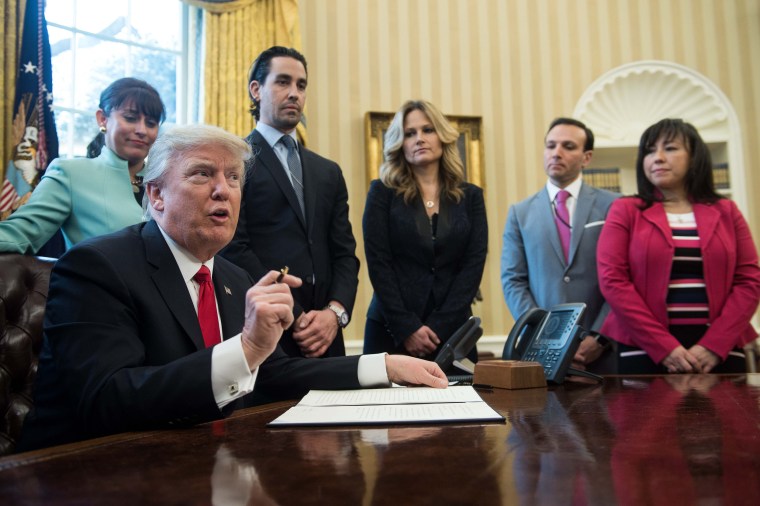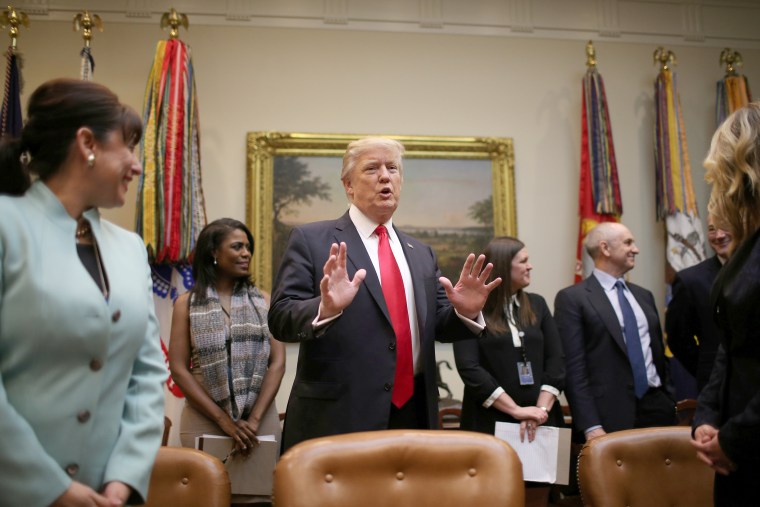President Donald Trump issued an executive order Monday aimed at significantly reducing regulation for businesses. Surrounded by small business leaders in the Oval Office, Trump slashed the new regulations budget to $0 and told reporters, "There will be regulation, there will be control, but it will be a normalized control."
All businesses have to navigate around regulations, but for small businesses, where resources tend to be tight, the regulatory work can be particularly cumbersome — and costly.
The just-released 2017 Small Business Regulations Survey found that the average small business owner spends at least $12,000 a year dealing with regulations. In addition, 14 percent of small business owners spend more than 20 hours a month on federal regulations, and more than half of small business owners spend a staggering $83,019 average on regulatory costs in their first year of operation.

An Entrepreneurial Buzz Kill
Adam Robinson, founder of Hireology, says the company was formed and built “100 percent under the Obama administration,” and that though it was able to grow over the course of just two years from 30 to 120 employees, navigating regulations has been a challenge. If he were starting his business last year, he doubts he’d have been able to flourish, due to certain regulations.
“I testified in front of the House Small Business Committee on the issue of Department of Labor changing the threshold at which non-exempt employees are eligible for overtime,” said Robinson. “I told them that if this overtime regulation had been in place, I literally could not have hired my first employee.”
Once a small business brings on a 50th employee, it faces another set of regulations, including the Affordable Care Act’s employer mandate, which requires that all businesses with 50 or more full-time equivalent employees provide health insurance to at least 95 percent of their full-time employees and dependents up to age 26, or face a fee.
To avoid having to deal with that mandate, small businesses may be disinclined to expand.
“If I am a growing service business and I have 49 employees, there is an incentive to me to stop growing because as soon as I get to 50 I am mandated [under the Affordable Care Act] to provide healthcare to all my employees,” said Robinson. “There’s no incentive to grow if it places an administrative burden on my business."
What a Difference Trump Could Make
Trump’s promises to repeal ACA, loosen regulations, and simplify the U.S tax code have many small businesses feeling optimistic.
“My team is very hopeful that Trump will make good on his promise of deregulation as well as on cutting corporate taxes,” said Jake Tully, a spokesperson for TruckDrivingJobs.com. “One of our biggest roadblocks has been the trucking industry regulations that pertain to hours of service that drivers can operate within, as well as the mandatory reset rules that dictate an individual's ability to operate. These regulations are meant to benefit the well-being of drivers, but can hamper one's ability to succeed on the road and therefore hinders the industry as we know it.”
Beth Zoller, legal editor at XpertHR, anticipates enhanced opportunity for small businesses under Trump.
"With his Republican pro-business leanings, President Trump will aim to reduce the regulatory burden on employers and smaller employers will see significant benefits to this as it will result in a savings of money, timem and resources," said Zoller, legal editor at XpertHR. "The economy could also grow as a result."
The Potential Downside of Deregulation and Revisions
The idea of spending less time and money on complying with regulations sounds pretty great, but some business owners are anxious about losing regulations that have a noble purpose.
“I am a small business owner myself and I think regulation is generally a good thing,” said Steve Silberberg, owner of Fitpacking. “The [report] says that the average small business owner is spending at least $12,000 every year dealing with regulations, yet the report also shows that over one quarter (27 percent) of the respondents grossed between $1-5 million. So we’re talking about less than 1 percent going to regulations.”
A concern of Silberberg’s, whose business is focused on backpacking adventures, is that Trump will deregulate National Parks, allowing anyone to go at any time with no permit.
“This would be pretty bad for my business,” said Silberberg, adding, “For the moment, National Parks seem to be somewhat safe, but who’s to say they won’t open up the Grand Canyon to uranium mining?”
Rafael Romis, CEO of the small business Weberous, admits that he would love to pay fewer taxes and spend less time managing regulations, “but on the flip side, a lot of regulations exist for a good reason.”
Romis also wonders how Trump will simplify the tax code and how changes there could impact small businesses.
“Redoing the tax code would affect the whole accounting industry and the small businesses that will have to learn it, said Romis. “That’s a bit scary to me.”
A Longing for Stability
Chris Eilers, president-elect of the Minnesota Chapter of Entrepreneurs' Organization and the CEO of Dunn Brothers Coffee, senses heightened anxiety in the small business community because of both the uncertainty around looming changes, and “the fact that there hasn't been a consistent approach to addressing regulations” in recent years.
“I think ultimately, small business owners are looking to see how a new administration will be able to effectively work with a Congress that hasn't shown its ability to really be bipartisan and pass meaningful regulation that would be good,” said Eilers.
And there’s another heart of the matter: What would be reasonable, but also good, and what does good mean in the land of regulations? It really depends on the business.
“If you rely on immigrant populations, from a staffing standpoint your concerns will be different than if you’re a small business owner manufacturing products domestically," said Eilers.
"I think were all just waiting to see the details, and trust the administration understands that we're part of a world population and that we can't operate in a bubble.”
